About Us
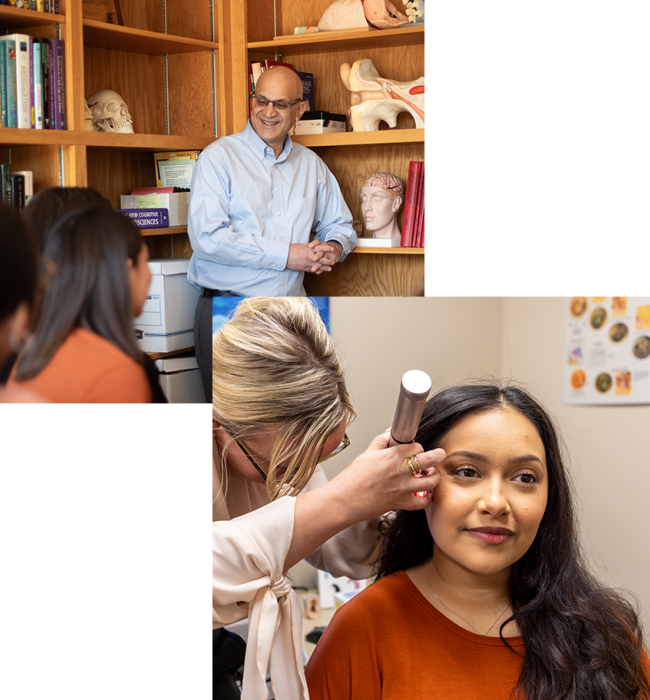
Our Mission
Our vision is to be the highest-impact Speech, Language, and Hearing Sciences department in the world, leading through innovation, collaboration, knowledge, and integrity. We provide comprehensive programs of scholarship to advance the understanding of human communication and related disorders, build foundational knowledge and skills for academic and clinical practice for the professional lifetime, and promote a culture of collaboration and respect for others.
#14 SPEECH-LANGUAGE PATHOLOGY
2025 U.S. News and World Report's Best Graduate Schools
#18 DOCTORATE OF AUDIOLOGY
2025 U.S. News and World Report's Best Graduate Schools
Department Leadership
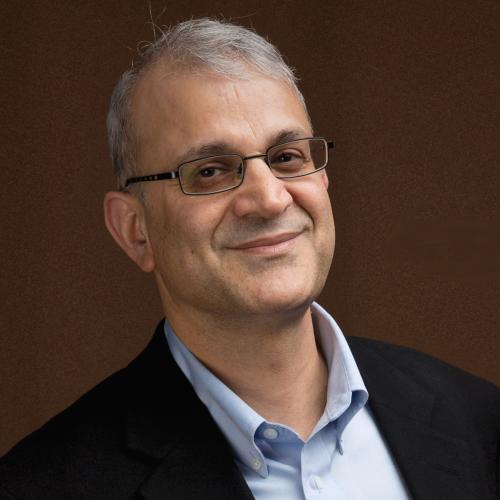
Rajinder Koul, Ph,D., CCC-SLP
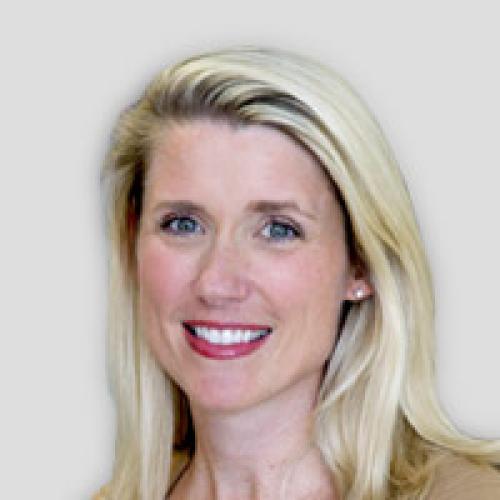
Courtney Byrd, Ph.D., CCC-SLP

Julia Campbell, PhD, AuD, CCC-A, F-AAA
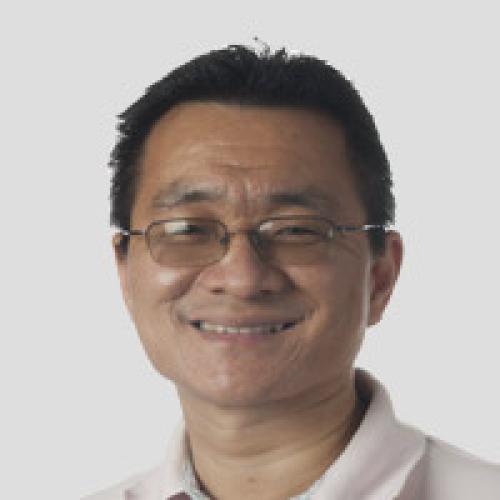
Chang Liu, Ph.D.
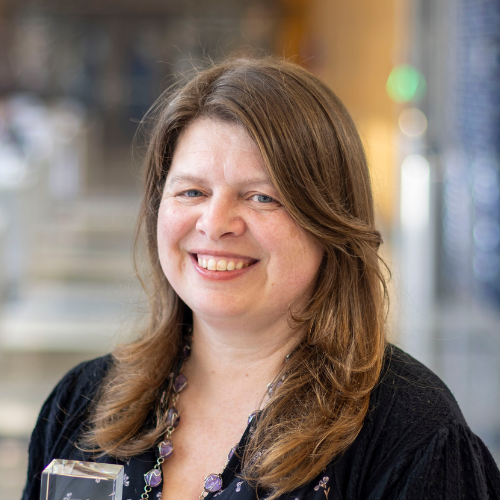
Carmen Hoffman
SLHS Departmental Staff
Robert Moya
Elaine Kilduff
UT Speech and Hearing Center Staff
Anita Ray
More About the SLHS Department
Goals, Objectives, and Actions
People:
Attract, grow, support, and retain talented students, faculty, and staff who are committed to sustaining the vision of the department and advancing the field.
- Secure five tenure-track faculty lines including opportunity hires to add depth and strengthen areas of research expertise within the department.
- Secure four clinical faculty lines to strengthen our audiology and SLP clinical education and patient care across the lifespan.
- Secure two administrative/clinical staff lines to support the growth in faculty size, student enrollment, and patient clinic visits. Continue to competitively recruit the most talented undergraduate and graduate students in Texas and outstanding out-of-state and international students. Recruit highly qualified doctoral students and post-doctoral fellows in speech, language, and hearing sciences for advanced research training.
- Retain outstanding faculty and staff by maintaining a supportive and intellectually rigorous environment.
Create and maintain a community and culture of belonging where all are welcome, seen, heard, and valued.
Foster a collaborative and supportive environment for faculty, staff, and students to thrive as members of the broader academic community.
Place:
Expand strategic mutual collaborations with the Dell Medical School and other departments and colleges at the University of Texas at Austin, in addition to external partnerships, to benefit our department, our patients, and society.
- Seek space and build a stand-alone SLHS Clinic in the Dell Medical School to support clinical practice and interdisciplinary research.
- Partner across campus and with external entities to grow the department’s impact, leadership, and engagement at community, state, and global levels.
Create and sustain accessible and innovative facilities to support SLHS academic program.
- Provide state-of-the-art research and clinical infrastructure.
- Seek philanthropic support to name Speech, Language, and Hearing Center and/or department.
Experience:
Strengthen innovative advising, mentoring, and training to create dynamic, and successful futures in the disciplines of Audiology, Hearing Science, Speech-Language Pathology, and
Speech and Hearing Sciences.
- Enhance existing experiences and create new clinical experiences by increasing the scope of service delivery and populations served.
- Foster the development of engagement opportunities for faculty and students with local, national, and global impact.
- Expand awareness of, and support for, SLHS’s unique impact and influence within our campus, community, state, country, and world.
Education:
Meet programmatic (American Speech-Language-Hearing Association Council on Academic Accreditation) accreditation standards and ensure that graduates enrolled in professional programs meet current standards for national certification (ASHA Council for Clinical Certification) and Texas licensure.
- Seek approval and implement the Graduate Bilingual Stackable Certificate in Speech-Language Pathology.
- Prepare students who understand and apply evidence as the basis for clinical decision making.
- Seek personnel preparation grants to support speech-language pathology and audiology education.
Expand interdisciplinary and innovative academic offerings at all educational levels.
- Provide students and future practitioners with academic and clinical curriculum that promotes inter-professional collaborative skills.
Recognition as an international leader in preparing Ph.D students and post-doctoral fellows for advanced research training.
- Promote interdisciplinary research experiences for PhD students and mastery of the tools/techniques necessary for research excellence and innovation.
Strengthen and grow our Bachelor of Science Program in SLHS.
- Remain the School of Choice for the most talented students in Texas and for outstanding out-of-state students by expanding clinical, research and community outreach experiential learning opportunities.
Research:
Expand our capacity and excellence in Speech Language and Hearing Sciences research.
- Excel the field in external research funding, number of publications, average impact factor scores, number of citations, and other relevant metrics.
- Excel the field in translational and applied research with strong impact on the quality of life of people with speech, language, hearing, and swallowing impairment across the life
span. - Seek federal training grants such as NIH T32 to support graduate education.
- Increase support for undergraduate research participation.
Update our research infrastructure, operations, and guidelines to increase support for impactful research in our department.
- Seek greater laboratory space and research infrastructure to support data collection and training of graduate students and post-doctoral fellows.
The University of Texas at Austin is committed to an educational and working environment that provides equal opportunity to all members of the University community. In accordance with federal and state law, the University prohibits unlawful discrimination, including harassment, on the basis of race; color; religion; national origin; gender, including sexual harassment; age; disability; citizenship; and veteran status. Discrimination on the basis of sexual orientation, gender identity, and gender expression is also prohibited pursuant to University policy. Any member of the University community who believes they have been subject to discrimination, harassment, or retaliation should contact the Department of Investigation and Adjudication (DIA) via e-mail at dia@austin.utexas.edu; or by phone at (512) 471-3701.
For further University Catalog information, please see here.
Contact Us
Main Office CMA 4.114
Phone: (512) 471-4119
Email Us: slhs@austin.utexas.edu

